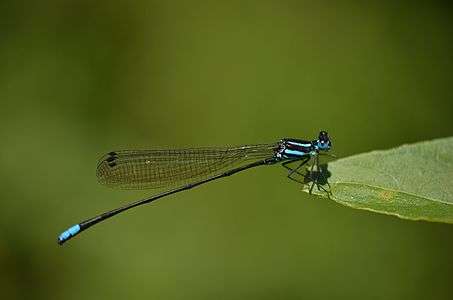Esme mudiensis
Esme mudiensis[2][1] is damselfly in the family Platycnemididae. It is commonly known as the Travancore bambootail.[3] It is endemic to Western Ghats in India, south of Palakkad Gap.[1][4]
| Esme mudiensis | |
|---|---|
 | |
| male | |
| Scientific classification | |
| Kingdom: | |
| Phylum: | |
| Class: | |
| Order: | |
| Family: | |
| Genus: | |
| Species: | E. mudiensis |
| Binomial name | |
| Esme mudiensis Fraser, 1931 | |
Description and habitat
It is a medium sized damselfly with black-capped blue eyes. Its thorax is velvet-black on dorsum and azure blue on sides. The dorsum is marked with narrow ante-humeral blue stripes. There is another moderately broad black stripe over the postero-lateral suture. The base of the sides are pale blue. Wings are transparent with black and diamond shaped pterostigma. Abdomen is black, marked with azure blue on segment 1 and 2. Segments 3 to 6 have very narrow baso-dorsal annules. Segments 8 to 10 are blue. There is a narrow black basal annule on segment 8. The ventral borders of all segments are broadly black. Anal appendages are black. Female is similar to the male; but more robustly build.[5]
It can be easily distinguished from other species of Esme by the labrum being entirely unmarked with metallic blue-black.[5]
It is usually found along hill streams, and seen perched on riparian vegetation.[5][6][7][3][8]
See also
- List of odonates of India
- List of odonata of Kerala
References
- Kakkasery, F. (2011). "Esme mudiensis". IUCN Red List of Threatened Species. 2011: e.T175170A7116857.
- Martin Schorr; Dennis Paulson. "World Odonata List". University of Puget Sound. Retrieved 12 Oct 2018.
- "Esme mudiensis Fraser, 1931". India Biodiversity Portal. Retrieved 2017-03-12.
- K.A., Subramanian; K.G., Emiliyamma; R., Babu; C., Radhakrishnan; S.S., Talmale (2018). Atlas of Odonata (Insecta) of the Western Ghats, India. Zoological Survey of India. pp. 116–117. ISBN 9788181714954.
- C FC Lt. Fraser (1933). The Fauna of British India, including Ceylon and Burma, Odonata Vol. I. Red Lion Court, Fleet Street, London: Taylor and Francis. pp. 264-266.
- C FC Lt. Fraser (1931). Additions to the Survey of the Odonate (Dragonfly) Fauna of Western India, with Descriptions of Nine New Species (PDF). pp. 472–473.
- Subramanian, K. A. (2005). Dragonflies and Damselflies of Peninsular India - A Field Guide.
- "Esme mudiensis Fraser, 1931". Odonata of India, v. 1.00. Indian Foundation for Butterflies. Retrieved 2017-03-12.
External links
![]()
![]()
